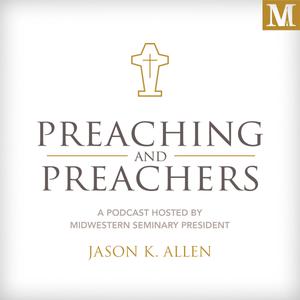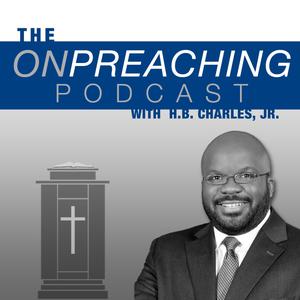
Monday Morning Preacher
Preaching Today
Preaching Today exists to encourage and equip pre…
- 23 minutes 2 secondsFour Things We Learned About Preaching: Season Finale
In this episode, co-hosts Matt Woodley and Kevin Miller reflect on what they learned about preaching, over the last four seasons of Monday Morning Preacher. Here are the top lessons they learned in the last four years:
1. Preaching the Word of God changes lives.
2. Preaching is something that we never master.
3. God uses ordinary preachers.
4. When you do sermon prep and preach – immerse yourself in the Bible scene.
Matt said “God uses ordinary preachers, not just the superstars, not just the people with the big platforms, not just the people with the big venues but God uses ordinary preachers, sometimes in small towns, sometimes in small places.” Your job as a preacher is to invite people into a whole new world, the life of the Kingdom of God.
Check out what was referenced on the podcast:
- Wendell Berry’s poem “Like Snow” on Parabola.org.
- “Stick the Landing” on Preachingtoday.com
- “Called to Faithful, Not Successful Preaching” on Preachingtoday.com
- “How to Preach with a Biblical Imagination” on Preachingtoday.com
- “Preaching as a Human Exercise Centered in Christ” on Preachingtoday.com
Learn more about your ad choices. Visit podcastchoices.com/adchoices
22 November 2021, 4:21 pm - 31 minutes 29 secondsPreaching With Both of Your Eyes Towards Christ
How can you keep Christ at the center of your preaching? In this episode, Matt Woodley explores that question with Bryan Chapell, the Stated Clerk for the Presbyterian Church in America.
In his early years of preaching, Chapel wanted to both teach and reach people. Later, he learned how to restore people, build on his ministry, inspire other preachers, and unite in a common cause.As a young pastor, Chapell’s message in sermons was “straighten up, fly right and do better.” But that message started to crush him, and he was convicted to preach the redemptive grace of Christ to his people.
Check out what was referenced on the podcast:
Bryan Chapell’s book “Christ-Centered Preaching” 3rd Edition
Learn more about your ad choices. Visit podcastchoices.com/adchoices
8 November 2021, 3:31 pm - 24 minutes 35 secondsChristmas Preaching and The Loneliness of The Holy Family
How can you bring a fresh angle to your next Christmas sermon? In this episode, Matt Woodley explores that question with Timothy Clarke, senior pastor at First Church of God in Columbus, Ohio. Here are four people from the Biblical narrative, that you can encourage your listeners empathize with:
- Zachariah and Elizabeth: the loneliness of disappointment, for her barrenness
- Joseph: the loneliness he felt, trying to decide how to proceed with Mary, given the complex situation before them
- Mary: the loneliness she felt, in miraculously conceiving the infant Jesus and being ostracized for it
“The incarnation says God became a human being!” Clarke said. He indicated that the incarnation alone is reason enough to be excited, and should offer plenty of material for Christmas preaching.
Check out the show-notes:
Thy hymn “Hark! The Herald Angels Sing” written by Charles Wesley
Learn more about your ad choices. Visit podcastchoices.com/adchoices
26 October 2021, 1:51 am - 23 minutes 2 secondsThree Ways to Create Tension in Your Sermon
Why does tension even matter in a sermon? How do you keep the tension? Co-hosts Matt Woodley and Kevin Miller explore these questions, considering the scriptures. Here are three ways that you can keep tension in your sermon:
- Highlight the tension that’s already in the Biblical text.
- Keep the bold Biblical statements bold.
- When presenting the Biblical truth, also give credit to what you can in the opposing view.
Miller said, “when we lose tension in our sermon, listeners lose interest.” As a result, your listeners can disengage from the Word of God. We also cannot negate, the boldness found in scripture.
Here’s an example he gave, to illustrate that boldness: “But if you do not forgive others their trespasses, neither will your Father forgive your trespasses (Mt. 6:15).”
Check out the show-notes:
- Jill Briscoe’s sermon entitled “Yet I Will Praise Thee” on our website
- Tim Keller’s book “Preaching: Communicating Faith in An Age of Skepticism”
Learn more about your ad choices. Visit podcastchoices.com/adchoices
11 October 2021, 10:05 pm - 23 minutes 38 secondsMaking the Most of Your Time for Sermon Prep
How can you find the time you need for sermon prep? After all, time is a precious commodity. In this episode, Kevin Miller explores that question with Trevor McMaken, pastor of City Light Anglican Church in Aurora, Illinois.
He said “a big thing that’s helped me in my preaching ministry is to take study days to plan a message series ahead of time, so that when I get to Monday morning and I’m looking at the message on Sunday – it’s not a completely blank page.”
Here are time saving methods, to help you with sermon prep:
- Start a preaching team at your church
- Block off your mornings for sermon writing and research
- Work on your sermon offline (free yourself from digital distractions in the process)
- Go for a “big idea” prayer walk
- Use time management software (to block distracting social media sites)
McMaken also recommends facing your internal struggles head on, without making them your entire focus. Remember, your calling is to be faithful to the Lord, and serve the congregation that He’s entrusted to you.
Learn more about your ad choices. Visit podcastchoices.com/adchoices
28 September 2021, 7:08 pm - 22 minutes 28 secondsWhy the Ministry of Presence Can Help People in Hard Times
How can you help people maintain faith when they are suffering? In this episode, Kevin Miller explores that question with Emily H. McGowin, Assistant Professor of Theology at Wheaton College.
She said, “silence in the face of suffering is not an indefensible reaction. We should be humbled into quietness, and not be quick to speak when we encounter suffering.”
When McGowin’s mother-in-law died at 46 years-old, people tried to offer rational responses, which wasn’t helpful. But the people who ministered to her with their physical presence really helped her see the love of Christ, in that difficult time.
“I work very hard to try to convince students that God is good, in His very essence, and that means that God is therefore, already opposed to evil – not orchestrating it for some sort of mysterious end,” she said.
Miller also emphasized the importance of drawing attention to the resurrection, in response to death and suffering.
Check out what was referenced on the podcast:
- Lament for a Son by Nicholas Wolterstorff (William B. Eerdmans Publishing Company, Grand Rapids, MI: 1987)
- The Doors of the Sea: Where Was God in the Tsunami? by David Bentley Hart (William B. Eerdmans Publishing Company, Grand Rapids, MI: 2011)
Learn more about your ad choices. Visit podcastchoices.com/adchoices
13 September 2021, 1:00 pm - 27 minutes 48 secondsApply Your Sermon with the Help of the Holy Spirit
How can you apply your sermon, based on the Biblical text? In this episode, Kevin Miller explores that question with Robert Smith, Jr., Chair of Divinity at Beeson Divinity School where he teaches Christian Preaching.
He said, “without a sermon application, there really is no sermon, because the Bible is not only written to answer the what question – that is information, but the so what question - that is application.”
The Holy Spirit guides the application, and the preacher explains what the text meant when it was written, and what it means for hearers today, according to Smith.
He said the application should be applied based on:
- The Biblical text.
- How the text speaks to the preacher.
- What the text is saying to the church.
- How the text applies to society at large.
Smith is concerned that whites will make it a privatized matter of spiritual only, and blacks will make it a matter of the social only.
Check out what was referenced on the podcast:
- Doctrine That Dances: Bringing Doctrinal Preaching and Teaching to Life (B&H Publishing Group, Nashville: 2008)
- The Glory of Preaching: Participating in God’s Transformation of the World (Intervarsity Press, Downers Grove, IL: 2009)
Learn more about your ad choices. Visit podcastchoices.com/adchoices
30 August 2021, 3:28 pm - 32 minutes 3 secondsPreaching as a Human Exercise Centered in Christ
What is preaching? In this episode, Darrell Johnson, author of The Glory of Preaching explores that question with Matt Woodley.
“I think we’re to proclaim the truth of the text, proclaim the Jesus of the text, and teach what the text is all about” Johnson said.
How does the Bible talk about preaching? “There are a number of verbs used for the preaching moment including “proclaim, herald, evangelize, good news, teach, exhort and bear witness,” he said.
He recommends asking yourself these questions, when preparing your sermon:
- Do you have the main point of the author?
- Are you trusting your personality or the Holy Spirit?
He has been preaching for more than 50 years, and currently serves as a Teaching Fellow at Regent College in Vancouver, Canada.
Learn more about your ad choices. Visit podcastchoices.com/adchoices
16 August 2021, 8:13 pm - 21 minutes 25 secondsWhat Preaching Authority Looks Like For You, the Pastor
Pastors aim to speak with authority, but it’s not easy in the 21st century. According to the Edelman Trust Barometer, there’s “a widespread mistrust of societal institutions, and religious leaders around the world.”
Be encouraged, the apostle Paul admonished Christians to preach the gospel with boldness and authority. He received his preaching authority “by revelation of Jesus Christ” (Gal. 1:11-12). But even if God has given you authority to preach the gospel, why should people listen?
In this episode, Matt Woodley and Kevin Miller explore that question. When Jesus gave the Sermon on the Mount “he was teaching as one who had authority, and not as their scribes” (Matt. 7:29). Considering this, Kevin lays out three types of authority that preachers have:
- The authority of pastoral love.
- The authority of personal weakness.
- The authority of proclaiming Christ.
“I have to live through a prayerful, weak dependence upon the Lord and the text” Kevin said. That’s what helps him sort through his own emotions and rely on God instead.
Learn more about your ad choices. Visit podcastchoices.com/adchoices
2 August 2021, 8:19 pm - 21 minutes 47 secondsHow to Exegete Like the Great Preacher, John Stott
How can you exegete like John Stott? In this episode, Matt Woodley and Kevin Miller explore that question. They reflect on Stott’s sermon “The Greatest Invitation Ever Made” that’s based on Matthew 11:28-30, which includes two invitations for listeners. Sometimes, preachers don’t know what to bring into the sermon and what to leave out. “We dump way too information on our people. We don’t know where to stop,” Matt said.
He also indicated that pastors should read the text, observe, listen and slow down. Andy Abernathe, Associate Professor of OT Theology at Wheaton College says “read, read, read” when exegeting the text. Here are four steps you can follow:
- Do your exegesis.
- Find your big idea.
- Know what to leave out.
- Give your people a simple path.
Check out what was referenced in this episode:
Frederick Dale Bruner’s book Matthew: A Commentary, Volume 2
Learn more about your ad choices. Visit podcastchoices.com/adchoices
19 July 2021, 7:28 pm - 27 minutes 34 secondsThe Role of Deliberate Practice in Preaching
How can you practice deliberately as a preacher? In this episode, Matt Woodley explores that question with Jared Alcantara, associate professor of preaching at Baylor University’s George Truett Theological Seminary in Waco, Texas.
Deliberate practice in preaching is a “relentless ongoing commitment to growth.” He also cites the work of K. Anders Ericsson, a Swedish psychologist who wrote “Peak: Secrets from the New Science of Expertise.” He identifies four commitments people often make, who become experts in a given field, like preaching or playing the violin.
- The willingness to take risks
- Constructive feedback
- Focused attention
- Concrete goals
This concept is more widely known from Malcolm Gladwell’s book Outliers where he popularized the 10,000 rule. The rule says that “it takes 10,000 hours of intensive practice to achieve mastery of complex skills and materials, like playing the violin or getting as good as Bill Gates at computer programming” according to Alcantara.
Check out what was referenced on the podcast:
- Gardner C. Taylor’s article “The Preacher’s Dialogue”
- Anders Ericsson’s book Peak: Secrets From the New Science of Expertise
- Malcolm Gladwell’s book Outliers: The Story of Success
Learn more about your ad choices. Visit podcastchoices.com/adchoices
6 July 2021, 5:25 pm - More Episodes? Get the App
Your feedback is valuable to us. Should you encounter any bugs, glitches, lack of functionality or other problems, please email us on [email protected] or join Moon.FM Telegram Group where you can talk directly to the dev team who are happy to answer any queries.
 The Calling
The Calling
 Preaching and Preachers
Preaching and Preachers
 EST. - For the Established Church with Micah Fries, Sam Rainer and Josh King
EST. - For the Established Church with Micah Fries, Sam Rainer and Josh King
 Revitalize & Replant with Thom Rainer
Revitalize & Replant with Thom Rainer
 200churches Podcast: Ministry Encouragement for Pastors of Small Churches
200churches Podcast: Ministry Encouragement for Pastors of Small Churches
 On Preaching with H.B. Charles Jr.
On Preaching with H.B. Charles Jr.